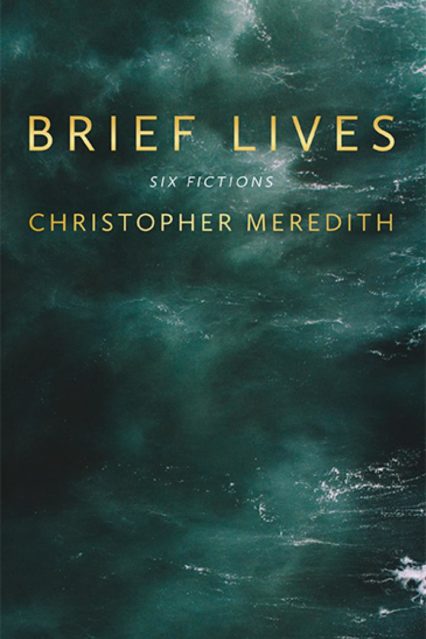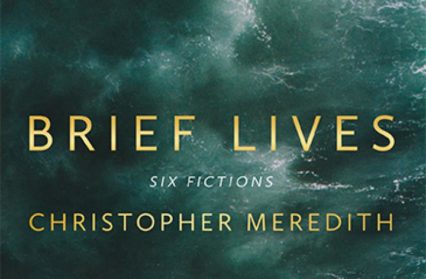Jim Perrin reviews, Brief Lives, a novel by Christopher Meredith, which includes six different intense fictional narratives.
Meet the aspirational writer. S/he who uses the medium of fiction to promote desired, class-defined paradigms of living. Who eschews the traditional and weighty moral questionings with which literature has concerned itself for millennia in favour of contemporary indices, shallow signifiers, which act as shorthand notations to characters’ states of being. The rhetoric of fiction is nowadays predicated on such materialist semiotics. The feted writers from English culture’s current, UEA-underpinned, metro-endorsed, process of embourgeoisement know how to tune them to the taste, values, education, mental underlay, and likely interests of the metropolitan reviewing coterie and reading-groups public, in a process which results in self-perpetuating, self-lauded, homogeneities of literary expression. Hence the popularity of McEwan, Atkinson, Faulks and the like. Writers who exist to shore up bourgeois society’s self-serving mythopoeic projects and exclusivities. Who refrain from any of the essential originality and challenge, the searching social examinations and ameliorations, the heurism proper to the novelists’ task. Whose common neo-euphuistic style perpetually draws attention to itself rather than to its subjects. “Beautifully written!” murmur the Hay-scented audiences, tilting their noses to appropriately-becoming appreciative angles…

Wales and Scotland are fortunate in having contemporary novelists who rise above the levels to which this process has reduced the variety and originality of current fiction from England. In Anglo-Welsh literature from the new millennium, Stevie Davies, Niall Griffiths and Rachel Trezise have been to the fore in exorcising the demons of conformity, respectability and sentimentality that – often quite subtly – bedevilled Welsh and Anglo-Welsh writing.
These national cultural flaws were challenged early and head-on by Kate Roberts – the great demotic voice in fiction from the slate region of the north. They were ironically enlisted by T. Rowland Hughes in his major socio-historical novels from Chwalfa to William Jones. Over the last thirty years another demotic voice, quietly insistent, uncompromising, of exceptional inventiveness, range, insight and versatility, has slowly come to make itself heard through virtuoso and creatively diverse performances such as Shifts (for which I voted in the 2014 Wales Arts Review “Greatest Welsh Novel of All Time” survey – the verdict, predictably, went to a defining example of the sentimental trait in Welsh writing); or the remarkable historical novel Griffri, with its monastic setting in the period of Y Gogynfeirdd; or the poignant, elliptical humour of Sidereal Time; or the offbeat meditative mordancy of The Book of Idiots. Every one of Tredegar-born writer Christopher Meredith’s sequence of fictions has been a literary event relished by a faithful and appreciative following. He has emerged as one of our most distinctive, imaginative, unexpectedly elegant and humane writers. Seren have just published his first venture into the characteristically Anglo-Welsh genre of the short story.
“Six Fictions” is the sub-title, the title itself – Brief Lives – borrowed from the seventeenth-century polymath and literary portraitist John Aubrey. There’s a kinship here. Aubrey and Meredith both possess sidelong humour distilled from acute observational skill. Aubrey, however imaginatively tinctured his characters may be, is held on the tight reins of historical verisimilitude and biographical fact. Fiction sets Meredith free from those constraints; though he remains true to an accurate portrayal of the atmospheres and plights of the post-industrial Valleys society in which his characters exist. Especially in the three stories which provide a central thread to this fine collection.
The first of this sequence-within-a-sequence, “Progress”, opens with “a thin young man” – that we never learn his name establishes his typological significance – at his wife’s behest taking a day off from his work as a railwayman to seek marginally better paid, though more arduous and dangerous, work as a collier. The story is a meditation on choice and its deciding values. “On a spring day in the middle of the twentieth century” the thin young man makes his and returns home on the bus, rehearsing the story he will tell his wife – that no work was available, and that he, she, their infant child, must make do with what they have. There will be no crossing the bridge for them. The power of the story – a quiet masterpiece – lies not only in its stark emblems but in what it leaves unsaid. Her unexamined consciousness is the achingly resonant suffering silent counterpoint to his self-aborted attempt at the aspirational. Of the other two stories in the central sequence, in “The Cavalry”, another nameless woman, a home help, with her two young boys visits an elderly man just before Christmas. The subject matter again is bleak, but the narrative is infused with motifs of firelight, humour, imagined elsewheres, and a ubiquitous sense of human community, kindness and concern. The longest of the central triptych, “The Enthusiast”, takes the history of a friendship begun in boyhood and extends it through a cuspal time of technological change impacting Valleys society:
I listened. I could hear the world again. The river. It wasn’t a roar, but a lot of complicated trickling, a lot of threads, a lot of voices laughing, not in one laugh but in the laughter of many conversations.
Christopher Meredith’s prose style is as fine and supple as any contemporary writer I know. It quietly and continually embraces dimensions of symbolism, resonances, that are suggested rather than laboured, and left to lodge in the readers’ imaginations and work there. And they do. The tadpoles in that river, for example, that “start eating each other when they grow a bit.”
“I know,” says the narrator, in summary, comment.
The first of these fictions, “Averted Vision”, re-works scenes equivalent to those of the freighter’s hold in Conrad’s Typhoon, anchoring them to a character’s solidly-realised previous life, which will be forever changed by a Lord Jim moment he will carry back with him when he returns to his former security. “Haptivox” is a sensuous science fiction that plays with notions of cryogenics, Kubla Khan and gender-fluidity, and contains some of Meredith’s most ravishingly lovely writing:
All the space that matter is made of suddenly understood itself, and was generous, and let the other in. Their different grammars and lexicons didn’t just blend into a creole. They atomized as they crossed and reconfigured. And once this had happened there could be no images, nothing to observe, only this new building, with nothing outside its own self-awareness and an apprehension of the marvellous.”
And the final story in Brief Lives, under the sardonic, socially-reflective title of “Closing Time”, in apocalyptic Welsh fashion imagines the innumerable hosts of the dead arising corporeally renewed from all the bleak hill burying grounds at the last trump and hastening westwards, “towards an orange smirch in a milky grey sky, and I would have to go back up the hill and over the shale and across the cinders with them. I thought of the gritty chippings of sugar lodging between the boy’s teeth and I knew that whatever lay at the end of my walk, it could not be paradise.”
Brief Lives by Christopher Meredith is available now from Seren Books.
More writing by Jim Perrin is available through the Wales Arts Review‘s website.











